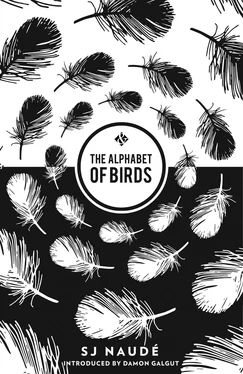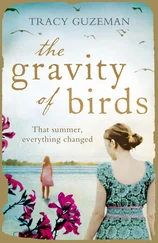‘Leave it, Beauty, there’s nothing more we can do.’
The taxi is being loaded by the garden gate. Ondien is supervising Mrs Nyathi’s maids, who are carrying their sound equipment from a storeroom in the backyard. What is left of Trixie is visible in the long grass. Next to it, the wooden plank with which the dog’s skull was crushed is glinting.
From the veranda behind them Mrs Nyathi is waving. They watch her standing there until they have turned the corner. Only once they have crossed the border into Lesotho does Beauty take Mixie out from under a small blanket in her carry bag.
‘Beauty! How could you? And the poor thing has almost suffocated.’ Ondien takes the dog from her. ‘Can’t turn around now, we’ll have to take her along and bring her back.’
She is suddenly feeling lighter, happy about the little dog’s body in their midst. The three of them look at each other in turn, stroking the long spine. Nungi laughs brightly. Here, on the other side of the border, a greater sense of freedom is washing over them than they have felt since returning to the country. An old familiarity between them is returning.
The higher they drive into the mountains, the cooler the air becomes. Outside there are kraals with thatched huts, streams in which melted water rushes. They drive past a blind man. He prods the air with his walking stick as if wanting to feel them, his eyes like silver coins.
The large (and largely male) turn-out may have something to do with the printing error on the poster: Victorian Naked Ladies’ Society , it reads on the lampposts along the main street, on the gate in front of the hall and above the hall’s entrance. Ondien shrugs her shoulders.
‘Go with the flow,’ says Nungi.
‘Hopefully that doesn’t mean you’re going to comply!’ Ondien says. They laugh.
The venue is located in the only street with streetlights. The audience is a hodge-podge. Entertainment is a rarity here. Shiny young people from the town wearing two-tone shoes or Nikes. Men arrive from the hills with blankets around their shoulders, ponies tied to lamp posts. A few broad-bottomed women with children sleeping on their backs after a day tilling the fields.
The local promoter is nowhere to be found. There is only one ticket-seller and no one to help set up the equipment. Ondien tries in vain to reach the sound engineer on her phone. He arrives twenty minutes late. It is not clear that he understands Ondien’s instructions.
Without collaborating musicians, the sound tonight is thin. Ondien is doing her best with the kwela whistle and the saxophone. Beauty and Nungi each have a harmonica. Otherwise the performance is vintage VNLS. Initially, Ondien experiences the familiar discomfort: she is the only white face. It is only when she decides that she is entitled to her white fears, that they are not unfounded, that she starts relaxing. She is assessing the audience, finely calibrating the performance. Nungi and Beauty are observing her carefully — without appearing to do so — and adjusting their actions cheerily. Ondien makes her concessions to the audience, allows them to recognise rhythms. The traditional South African elements are foregrounded this evening, the wide register of influences from North and West Africa are tempered. Then, when she has got them, when they start dancing unguardedly, she cannot help but pounce. She reacts with a left-field improvisation, lets confusion wash over the hall. Beauty and Nungi lose her for a few seconds, but then fall seamlessly into line. Ondien keeps Beauty in the corner of her eye. Her forearms are as thin as sticks — getting thinner with each performance since Paris.
Ondien’s eye is caught by a man standing utterly still at the edge of the light. A white man. She looks at his shoulders, losing her rhythm and voice for a moment. The audience stops dancing. They wait; after half a minute, they start fidgeting. She cuts the performance short. The evening has been long enough. When she walks off the stage, the other two following her, the audience just stands there in silence. The microphone whistles.
He approaches her outside, behind the hall. In his khaki shorts, his legs brown in the white light that is emanating from the hall, he looks like a farmer from the Free State, one of those men who drive white pickup trucks beyond the northern border, where she also grew up. There is a vague smell of engine oil in the air.
‘I don’t understand much of what you, or you’ — he looks at Nungi and then at Beauty, who is standing with Mixie in her arms — ‘do. But you’ve entertained this bunch, that’s for sure.’
‘Do you have somewhere to stay?’ he asks when they fail to respond.
Ondien looks at the other two. Beauty presses her cheek against the dog’s. It was the presumed power in those upper legs, Ondien later thought, and the set of perfect teeth, that made her ignore Nungi’s expression, and Beauty’s hesitancy.
‘Hendrik,’ he says. Only Ondien takes the hand he holds out. The next morning in the shower her hand will still smell of oil.
Ondien’s skull vibrates against the Land Rover’s window. Heavy tools press against her feet.
‘It’s midnight, we have to sleep over somewhere,’ she said to Beauty and Nungi, shrugging her shoulders, when Hendrik was out of earshot earlier. ‘Do you really want to trek all the way back to Nyathi’s place?’
Nungi was glowering. Beauty was counting Mixie’s vertebrae. Before Ondien could confirm, Hendrik had already started to load the sound equipment into the Land Rover. She did not ask where or how far. Ondien let the taxi, which was waiting to take them back to Vloedspruit, go.
Nobody speaks. They are going higher and higher, Hendrik’s forearm on the gear like an extension of the engine. Ondien is becoming lighter in the dark, and increasingly blind. When the road starts getting rough, memories shake loose. Before Lesotho there were the small South African towns. Before the towns there was Cape Town. And, before Cape Town, there was Paris. Before Paris, London. But it is in Paris where her mind now lingers. And with Thierry.
After she turned her back on the academic world of music in London (the loose threads of her unfinished PhD — The Role of Dance and Ritual in the Polyphonic and Polyrhythmic Construction of Traditional Zulu Music — she had decided, could not be tied together), Ondien arrived in Paris, penniless. She had met Beauty and Nungi during a previous research trip to KwaZulu-Natal. Their voices were already on a few recordings that she had added to the SOAS music library’s collection. They accepted her invitation to Paris exuberantly. Thierry, a Parisian world music promoter, was a contact of a contact at SOAS.
A friend of Thierry’s was in Mali for a year. The three of them could stay in the friend’s flat in the eighteenth arrondissement. Over beers and falafels from a Turkish takeaway, the three South Africans conceived VNLS one evening. Later she would remember VNLS as her idea, Thierry would as his.
It was not long before she and Thierry were bathing in each other’s sweat between his sheets in his Marais appartement . These were the days when, enveloped by a sheet and fog, she could still walk out onto his balcony above the roofs and catch a glimpse of new and promising seasons. Into which currents of her thoughts did Thierry tap so powerfully? she later wondered. Why did she plunge into things so mindlessly? She imagined it was something to do with the mystique surrounding things continental in her Free State childhood, with her mother’s thwarted dream of a singing career in European opera houses. Interwoven with this was her obsession with music cultures. She was impressed by the years that Thierry had spent in the heart of the music scenes in Senegal and Algeria, by his experience in the Parisian world music scene. She was tired of her lonely attempts to write art music in an academic sphere, the marginal pseudo-radical performances with student musicians in university auditoriums. All with such deadpan sincerity. Thierry would help her make music rather than theorise about it. The real thing, la vraie chose . And she was, of course, moved by the fact that he, in his way, in his world, through associations that she could barely understand or suspect, was clearly moved by her.
Читать дальше












